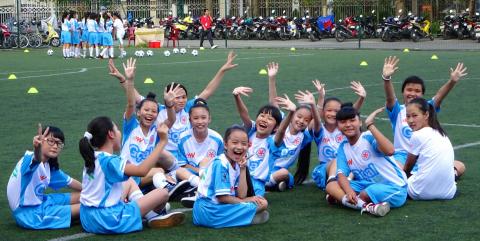You are in this section
Guest Blog: Winning lessons on and off the field
Maria Bobenrieth, Executive Director of Women Win, writes a guest blog for International Inspiration (IN) about the importance of women occupying a public and prominent space in sport - a timely contribution to celebrate the first day of the Sport for Development: A Catalyst for Change’ conference, which kicks off today. Maria joins a host of international practitioners from government, civil society, private sector and the sports community at the prestigious Wilton Park and will tomorrow speak about 'The influencing power of sport: peace, stability and equity.'
Currently ranked 67th in the world, the Cote d’Ivoire Women’s national football team qualified for the World Cup this year for this first time in history, beating much higher ranked teams like Nigeria and Equatorial Guinea along the road to Canada. Although they didn’t make it past the first stage, their presence at the Cup is a huge victory. This year there are also seven other first time qualifiers playing in the tournament - Ecuador, Spain, Thailand, The Netherlands, Cameroon, Switzerland, and Costa Rica – highlighting the diverse range of countries who have only recently found ways to invest in and develop their women’s teams. However, the combined achievements of these teams reach and reverberate far beyond the World Cup. They represent victories for girls and women everywhere who long to play football. Or who just want to be able to play, period. The pride these women will take home, win or lose, will be palpable and visible; in a world of ‘isms’, nationalism always trumps sexism.
The truth is that girls and women have the right to participate in sport, physical activity and recreation. That right to sport is clearly enshrined in several international charters and conventions, signed by most nations:
- Article 1 of the UNESCO International Charter of Physical Education and Sport
- Articles 10 (g) and 13 (c) of CEDAW
- Article 31 of UN Convention on the Rights of the Child
- UN Convention on the Rights of Persons with Disabilities
However, despite the right for universal participation, sport has traditionally been regarded as a male domain, and discrimination against women and girls remains widespread. In some places access to sport is entirely prohibited; in many other contexts women and girls are actively discouraged from participating; and universally there are less structures, institutions and facilities that enable girls’ and women’s participation. Moreover, discrimination against women and girls in sport is directly linked to persistent gender inequalities and discriminatory practices in society at large. Through their participation in sport, women and girls challenge a multitude of gender norms, stereotypes and discrimination. And, beyond participation, well-designed and effective sport programmes provide a platform for women and girls to not just claim their right to sport, but in doing so, to occupy public space, claim and move into leadership roles, access basic services, and participate in decision-making processes to collectively advocate for their rights.
At Women Win, we partner with organizations around the world who are implementing sport and life skills programs, with the exact goal of building the leadership and skills of adolescent girls. A young female participant at Girl Determined, a Myanmar-based NGO that fosters the skills girls need to influence change and transform their future, said, “I think girls can change the world - in the past we thought that girls could not change because girls didn’t know their rights. Now, we are coming to know our rights and we can ask for protecting and acquiring our rights so we can get the opportunity we need to lead. Before, there were no girl or women leaders and so we didn’t know that our rights were being violated and that we were facing such discrimination. Now we are learning ways to demand and secure our rights, at least at the level of our community.” Programs and organizations such as Goal Determined are essential for girls to start claiming their rights, not only to sport, but in all areas of life. But so too is the need for visible, strong female leaders and sport role models such as the players at the World Cup.
The upcoming ‘Sport for Development: A Catalyst for Change' event could not come at a better time. Female athletes are occupying space on the public stage at the World Cup, giving all of us the opportunity to bring attention to the importance of sport to empower individuals and unite communities. While women in sport are capturing the attention of the world, it is an important chance to commune and speak out about the inclusion of sport in the post-2015 development agenda and the Sustainable Development Goals.
So, as we continue to celebrate the World Cup in Canada over the next couple of weeks, let’s remember that by qualifying and participating, many of these teams are not only winning or losing on the field – they are scoring a goal against sexism and gender inequality at home and all around the world, and it’s time for us all to do the same.
About Women Win
Women Win is the global leader in girls’ empowerment through sport. They leverage the power of play to help girls build leadership and become better equipped to exercise their rights. Since 2007, Women Win has impacted the lives of over 1.24 million adolescent girls in over 100 countries. Maria has a strong professional and personal background in international business and community development. Born in Chile and raised and educated in the U.S., Maria has lived in the Netherlands since 2001.
Follow Women Win on Twitter @Women_Win or find them on Facebook.

